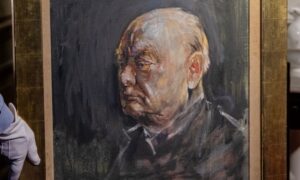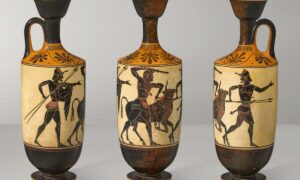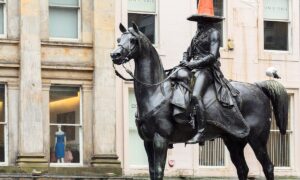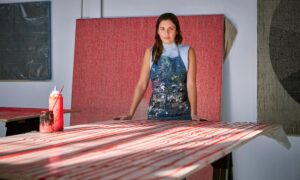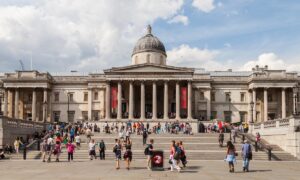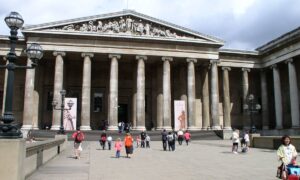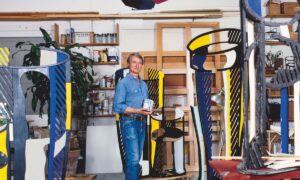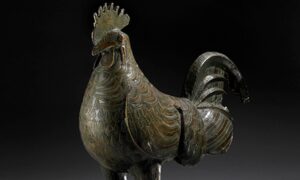
Mary Beard has said that the National Trust should “loosen up” and be less focused on conserving objects in order to bring visitors closer to the history of its houses—and counter attempts by advocate groups to drag it into the culture wars.The historian was speaking on Tuesday at the National Trust’s second annual Octavia Hill lecture in London. She said she had been “let loose” to speak her mind on a topic related to the trust, which is the largest conservation charity in Europe, responsible for more than 500 historic properties as well as hundreds of miles of countryside and coastline. The talk’s theme was “Who owns the past?”, and it was followed by an in-conversation between Beard and Gus Casely-Hayford, the director of the future V&A East Museum.The talk came at a time of tension for the trust, which remains in the national spotlight following a concerted pressure campaign led by the pressure group Restore Trust. This group—together with right-wing media outlets and populist figures such as the former UK politician Nigel Farage—has railed against the charity for supposedly abandoning its central conservation mission in order to focus on “modish, divisive ideologies”. Specific criticisms have included the way the trust has addressed histories of colonialism in its buildings, its decision to transform Sudbury Hall, Derbyshire into The Children’s Country House, and the accusation that it has “abolished Christmas”, after it excluded Christian holidays from an “inclusion and wellbeing calendar”.There has been some focus on the powers potentially driving Restore Trust’s campaigns. The group has, for example, been linked to London’s 55 Tufton Street, the home of several right-wing media and policy organisations. One of its founders and former board members, Neil Record (who was removed as a director in January), has been previously identified as a supporter of the Global Warming Policy Foundation, a climate-sceptic think tank operating out of the building. Meanwhile Zewditu Gebreyohanes, Restore Trust’s former director, has since before leaving the group been a senior researcher at think tank the Legatum Institute. The institute is part funded by the Legatum Group, which is a major shareholder in right-wing broadcaster GB News.The lions and the Van DycksIn her talk, Beard began by defending the trust, pushing back against the pressure it had received. “I can promise you that current attacks on on the trust’s 2020 interim report into the connections between colonialism and properties now under care of the National Trust is not a dastardly piece of anti-British subversion,“ she said, citing one example.She was not, however, interested in an “unmitigated love in between Beard and the trust”, and had her own bones to pick.Referencing a quip from the sixth marquess of Bath—who set up a popular safari park on his property in 1949— she talked about a competition at the National Trust between “the lions and the Van Dycks”, or in other words between nature and the arts. Discussing a visit to one trust tea shop, she said that the only posters on the walls were of saplings, snowdrops and swans. She admired what the trust did for nature, she said, but feels this exemplified an apparent “acceptance that the lions have already won, as they’ve also won in education, popular culture, and government funding streams.” She cited a recent report by The Times on visitor numbers, which focused on how tourists in the UK were turning to “castles and zoos” over art galleries.Letting the arts lose this battle risked missing out on the huge societal value inherent within the trust’s collections, she continued. The trust’s houses are “an almost unrivaled laboratory for facing the complexity of history, for seeing it afresh, for owning it and debating it,” yet the objects are left lacking in bold, imaginative interpretation. She gave the example of a painting of Archemides, the Ancient Greek scientist who could be seen as an “Oppenheimer of his day”—which had been left “languishing in quiet oblivion” at one property.The problem, Beard said, is we are witnessing a “blue gloveification”, a distancing from history—and in the case of the National Trust this has taken a literal turn, with swathes of its art and objects restricted by barriers and rope. The trust, she said, should be less risk averse. It should free up its chairs, many of which are not so precious as to need protecting. There should be, in general, “less conservation”. Speaking about Octavia Hill, one of the founders of the trust, Beard said: “she wrote about creating outdoor sitting rooms for the people. I would like to create a few more indoor sitting rooms for the people.”Beard, who said she had volunteered at Wimpole Estate in Cambridgeshire as research for the talk, made clear there are serious conversations that need to be had in these settings. She referred to objects that reflect the exploitative histories embedded within the trust’s properties, such as a pair of stands shaped to depict enslaved, chained figures on display at Dyrrhem Park, Gloucestershire.But overall, she said, “probably the best message is loosen up, do it a bit differently, enjoy the joke… You can try it and if it doesn’t work you don’t have to go on doing it.”Broader issuesThis all has an importance, she feels, that extends beyond changing what she said is the reputation of the country house as a bit dull, and “a bit old, white and posh”. It also has the ability, Beard says, to dampen some of the fiery debates that have been engulfing the trust in recent times.During the Q&A session, Casely-Hayford offered a counter to Beard’s challenge, noting that it is difficult to loosen up when culture has been “designated as the terrain of war”. Indeed, the trust’s battles are understood to be part of a much broader culture war, in which appointments at major institutions are being seen as attempts to exert control. Gebreyohanes, for example, made headlines when she was appointed as a trustee of the V&A in 2022 by Boris Johnson’s Conservative government.In response, Beard said: “When I say loosen up and enjoy the joke, I think in some ways that’s the best defence. I think the pomposity, self-righteousness of some of the criticism is best responded to with a bit of a giggle.”This was put to the test towards the end of the session, when one audience member asked about the decision to leave the National’s Trust’s Clandon Park as a preserved ruin, rather than restore it to its former glory—another key issue raised by Restore Trust last year. “I don’t care very much,” Beard responded to laughter. “There are arguments for both. In the end, I don’t think it’s a great moral issue… I just think, loosen up.”

